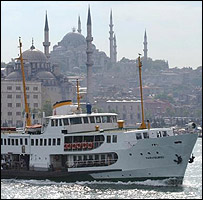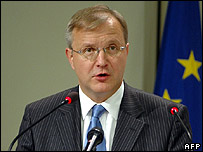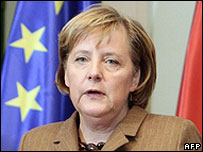|
By Oana Lungescu
BBC News, Brussels
|


The destination of Turkey's European journey is not yet clear
|
Few issues divide the Europeans as much as Turkey.
Divisions are becoming ever more apparent as the European Union nears the moment of truth in relations with its biggest and poorest applicant country, which also happens to be Muslim.
For EU leaders meeting in Brussels on December 14-15, the question will be how to punish Turkey if it fails to open its ports and airports to traffic from Cyprus. Turkey's promise to do so allowed it to open EU membership talks a year ago.
This week, several European commissioners pushed for the consequences to be spelled out in the Commission's progress report on Turkey.
According to officials, they were Markos Kyprianou of Cyprus, Stavros Dimas of Greece and Jacques Barrot of France.
Others - like Viviane Reding of Luxembourg, Louis Michel of Belgium and Jan Figel of Slovakia - raised serious concerns about the cost of integrating Turkey and the human rights situation.
Turkey's strongest advocates were Peter Mandelson of the UK and Charlie McCreevy of Ireland.
Germany's Guenter Verheugen even argued that Turkey should be treated as a special case.
That is hardly the official German line, but as a former enlargement commissioner, Mr Verheugen was bitterly disappointed when the Greek Cypriots rejected a UN plan that would have led to the reunification of the island in 2004, just days before Cyprus was welcomed into the EU.
Tough talking
In the end, the president of the European Commission, Jose Manuel Barroso, decided to give diplomacy one more chance, delaying a formal recommendation by five weeks.

Commissioner Rehn faces widespread scepticism in the EU
|
Why should we act suddenly, like an elephant in a china shop, asked Olli Rehn, the current enlargement commissioner. Instead, Mr Rehn, who is from Finland, asked everyone to back Finnish diplomatic efforts to achieve a breakthrough.
Finland holds the rotating EU presidency until the end of the year, but Finnish Foreign Minister Erkki Tuomioja also has a personal stake in the long-running Cyprus dispute. His father Sakari was the UN envoy to the island when fighting between the Greek and Turkish Cypriot communities broke out in 1963.
More than 40 years later, Mr Tuomioja junior puts the chances of a deal at 50/50.
But, with key elections next year, the Turkish government has given no indication it will budge on the sensitive issue of Cyprus.
Prime Minister Recep Tayyip Erdogan acknowledged there could be a "period of stagnation" in ties with the EU, but ruled out the possibility of accession talks collapsing.
"It's five minutes to midnight and Turkey is pursuing a risky strategy," says Camiel Eurlings, a Dutch conservative member of the European Parliament who monitors Turkey's progress.
Cyprus holds key
If Ankara does not make a gesture over Cyprus, even Turkey's friends agree there must be consequences.

The Turkey issue will be difficult for Mrs Merkel next year
|
"Turkey must implement its obligation to all EU member states. If it fails to do so, the EU must act," said Britain's Minister for Europe, Geoff Hoon.
To preserve the EU's credibility, Britain would probably back a limited freeze on only three or four policy areas in the membership talks - known as chapters - directly linked to transport and trade.
Other countries, like Sweden and Italy, argue EU rules must be respected, but would rather focus the debate away from Cyprus and more on the need for Turkey to speed up political reforms.
At the other end of the spectrum, Cyprus is calling for a freeze of all membership talks. It is a view supported by politicians in France, Austria, Germany and the Netherlands, the countries where most people want to keep Turkey out of the EU.
In one of the toughest statements so far, French Foreign Minister Philippe Douste-Blazy said the EU should rethink its timetable for Turkey's entry bid if it refuses to comply by December.
Germans divided
In Germany, which will take over the EU presidency in less than two months, the splits go right through the ruling coalition.
The Bavarian premier Edmund Stoiber, leader of the conservative Christian Social Union (CSU), called for a total suspension of talks with Turkey, which he said was not a European country anyway.
Chancellor Angela Merkel, who heads the main Christian Democratic Union (CDU) conservative party, dismissed Mr Stoiber's comments, but insisted there could not be "business as usual" if Turkey failed to keep its promise to lift restrictions on Cyprus.
In opposition, Ms Merkel advocated a "privileged partnership" for Turkey, like Mr Stoiber. In power, she remains more critical of Turkey than her foreign minister, the Social Democrat Frank-Walter Steinmeier.
"Some in Europe want to bring about a failure of Turkish negotiations through their rhetoric," Mr Steinmeier said, "this only strengthens the view in Turkey that they are not welcome in the EU - we need to fight against this impression."
Dream turning sour
EU leaders will have to reach a unanimous decision on Turkey, like on any other important matter.
One compromise solution could involve freezing talks on up to ten chapters.
But common ground is hard to find.
"My biggest fear," says MEP Camiel Eurlings, "is that there won't be unanimity. The difference between the positions of Cyprus and the UK is so huge that quite a big minority of countries could use the split to effectively cripple negotiations or bring them to a halt."
At first, that may not make much difference. Using its rights as an EU member, Cyprus has already been blocking technical talks for weeks.
"What we have is already a suspension," says a diplomat close to the negotiations. "We already have a crisis. The atmosphere has never been so bad in any membership talks."
For months, EU Enlargement Commissioner Olli Rehn has been warning Turkey of a "train crash".
But the membership train may already be on a dangerous course. If it goes off the tracks in December, MEP Camiel Eurlings fears relations between Turkey and Europe could suffer unpredictable damage.
"Does anybody think how difficult it would be to get the train back on track," Mr Eurlings asks, "with a Europe increasingly worried about enlargement and a Turkey which is becoming increasingly nationalistic?"